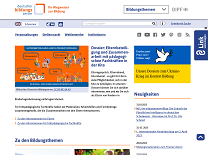Université Marien Ngouabi – english information https://www.bildungsserver.de/bisy.html?a=7643&spr=1
The official homepage of the Marien Ngouabi University shows the essentiel statistics and contacts of the university administration, especially of the single faculties and institutes. Additionaly, it offers information about the internal conditions for study at the university.

